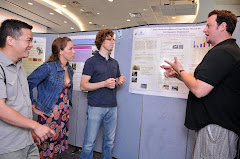"Emerging Technologies Ready to Reshape Community Colleges
Investments of $12.9 million aimed at boosting graduation rates, fostering faculty collaboration, creating new learning tools"
Investments of $12.9 million aimed at boosting graduation rates, fostering faculty collaboration, creating new learning tools"
"A summary of the grants announced today:
Global Skills for College Completion (GSCC) ($3.6 million) to innovate math and writing basic skills pedagogy via Web 2.0 and social media that consistently results in increased student pass rates, and is driven by an online community of 26 outstanding basic skills faculty in 16 states on 13 campuses. GSCC is a collaboration between the League for Innovation in Community College, LaGuardia Community College, Knowledge in the Public Interest, and the Community College Research Center.
Monterey Institute for Technology and Education (MITE) ($5 million) to produce developmental mathematics course materials that will be made available as an OER. The project aims to dramatically increase the number of students that meet the required mathematics standards for admittance to desirable postsecondary educational programs and career opportunities through interactive and adaptive multimedia and games. Individual students and teachers will have free access to the material through the HippoCampus website, and institutional rights-of-use may be purchased with a nominal membership fee.
Carnegie Mellon University’s Community College Open Learning Initiative (CC-OLI) ($2.5 million) for the collaborative development, use, evaluation, and continuous improvement of web-based open learning environments for high-demand “gatekeeper” courses. The CC-OLI learning environments will be developed by teams of learning scientists, human-computer interaction experts, software engineers, and faculty subject matter experts from over 40 community colleges across the country. The project will use intelligent tutoring systems, virtual labs, simulations, and provide frequent opportunities for assessment and feedback to combine the best technology with person-to-person instruction in “blended” courses. The target, over the next three years, is to increase successful course completion rates in the classes using CC-OLI by 25 percent.
National Center for Academic Transformation (NCAT) ($1.8 million) to engage community colleges in redesigning developmental math based on proven methods of integrating technology and learner-centered pedagogy. Course redesign at NCAT partner institutions has resulted in an average of 51 percent increase in course completions and 37 percent reduction in instructional costs."
To read more about the projects or to apply for a grant (if applicable), please visit the Gates Foundation for more information or the specific grantees/partner websites.
http://www.gatesfoundation.org/press-releases/Pages/fundamental-changes-to-community-college-education-091203.aspx
